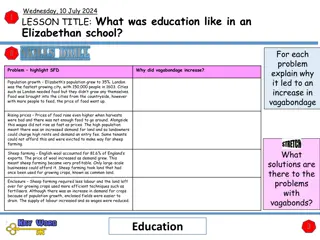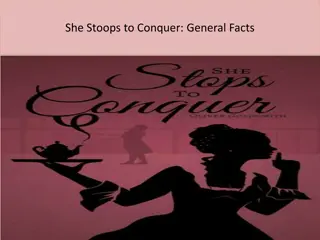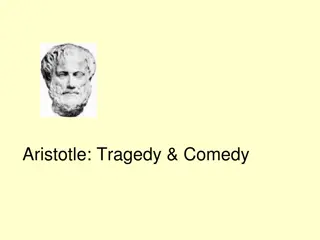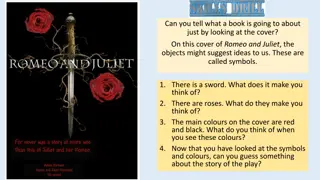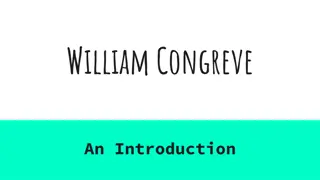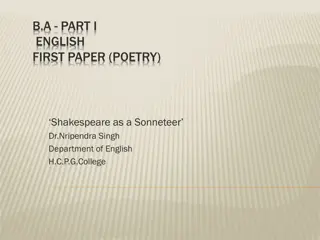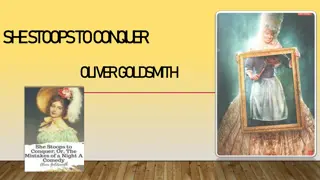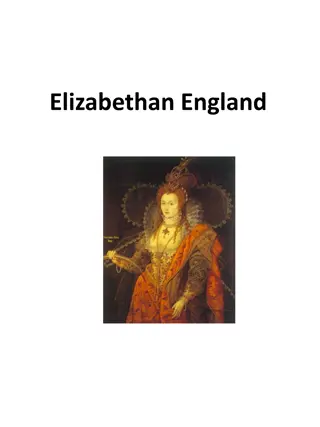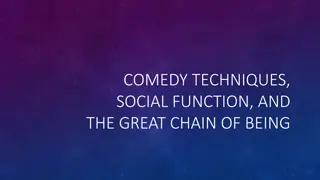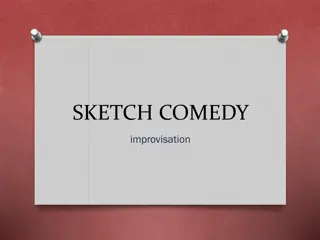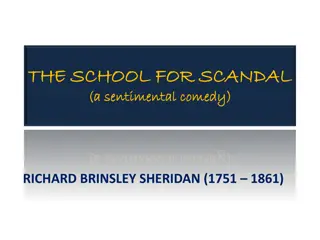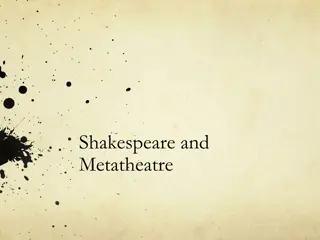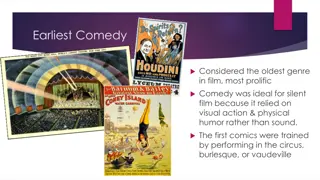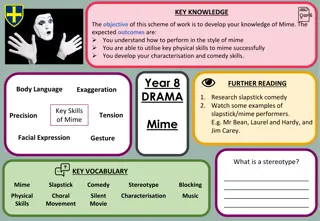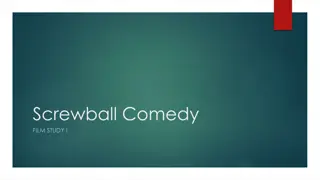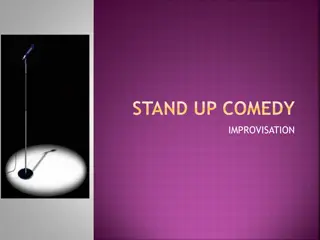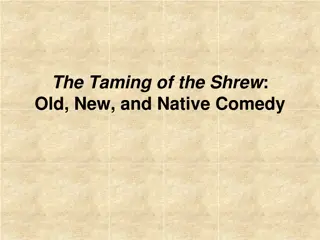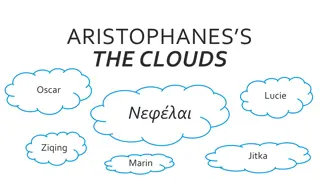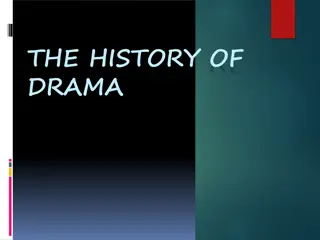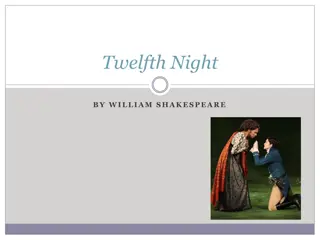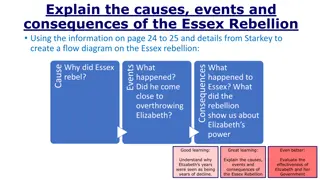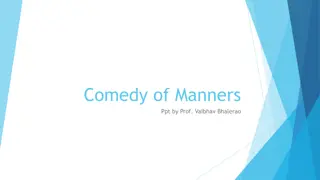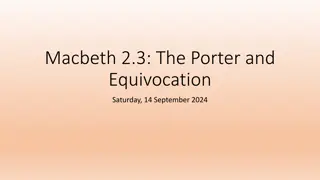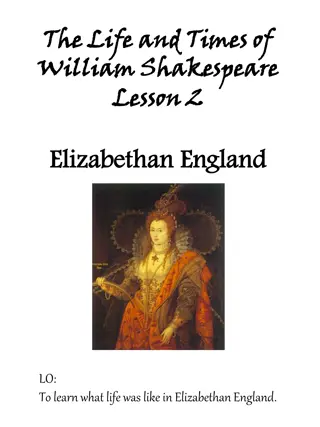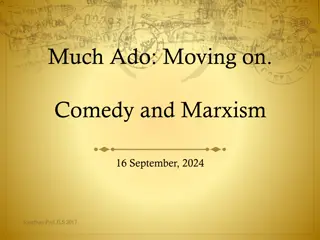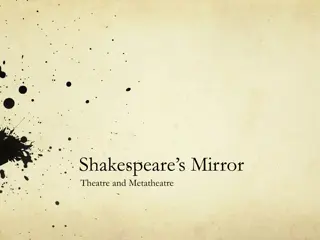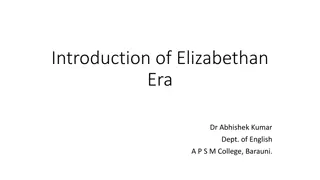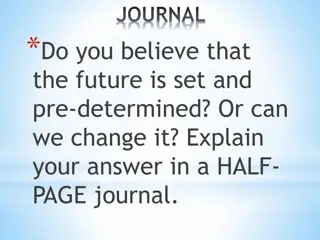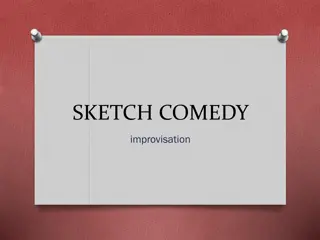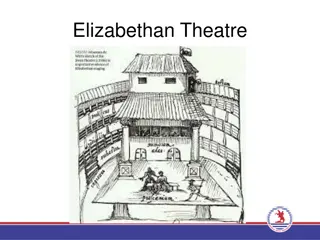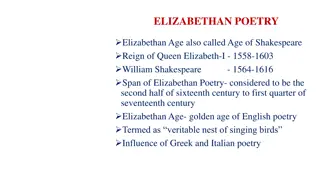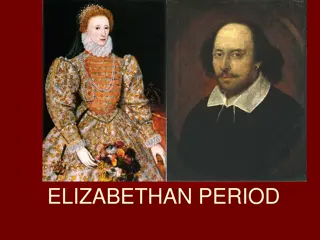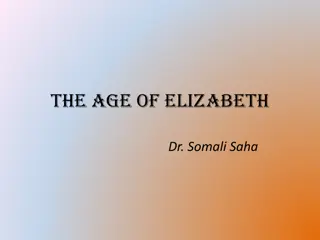Unraveling the Humor: Exploring the Depths of Comedy
Comedy, a genre designed to elicit laughter and mirth, transcends cultural boundaries with its diverse forms like romantic comedy, horror comedy, and political comedy. What makes us laugh varies across individuals and contexts, often rooted in incongruity theory where unexpected twists spark joy. Co
0 views • 23 slides
Education in Elizabethan England: Understanding the Impact on Vagabondage
Explore the educational landscape of Elizabethan England and its effects on societal issues like vagabondage. The content delves into the challenges faced in schools, the reasons behind the increase in vagabondage, and potential solutions to address these issues.
1 views • 7 slides
She Stoops to Conquer: A Comedy of Manners from the Georgian Era
She Stoops to Conquer is a play by Oliver Goldsmith inspired by real events he experienced. Set in 18th-century English countryside, the play follows humorous misunderstandings and antics of characters like Marlow and Kate. Published in 1773, it is a Laughing Comedy with Mrs. Hardcastle as the antag
0 views • 5 slides
Aristotle's The Poetics: Tragedy and Comedy Analysis
Aristotle, the Greek philosopher, introduced key concepts in his work The Poetics, focusing on tragedy and comedy. He countered Plato's views on literature and emphasized the importance of imitation, catharsis, and the unity of time, place, and action in dramatic composition.
0 views • 32 slides
Symbols and Facts: Uncovering Shakespeare and Elizabethan Theatre
The analysis begins by exploring the symbols present on the cover of "Romeo and Juliet" such as the sword and roses. It then delves into distinguishing facts from opinions regarding Shakespeare's life, touching on key events like his baptism, marriage, and career. Additionally, it provides insights
0 views • 26 slides
Elizabethan Religious Settlement: Unity Amidst Division
Amid religious division in England, Queen Elizabeth I implemented a Religious Settlement in 1559 to unify the country. The settlement, a blend of Protestant and Catholic elements, aimed to maintain peace and prevent rebellions. Elizabeth's strategic compromise pleased most people, though lingering t
0 views • 14 slides
The Influence of William Congreve on Restoration Comedy
William Congreve, an English playwright and poet of the Restoration period, is known for his clever and satirical dialogue that influenced the comedy of manners style. The Restoration period marked the end of Cromwell's Commonwealth and the return of monarchy with Charles II. Comedy of manners refle
0 views • 10 slides
Shakespeare's Sonnets: Treasures of Elizabethan Poetry
Shakespeare's sonnets, considered precious pearls of Elizabethan poetry, were written primarily in 1594 under the patronage of the Earl of Southampton. Divided into sections addressing a young man and a Dark Lady, they explore themes of love, beauty, and passion with a unique perspective. Despite be
0 views • 8 slides
Exploring 'She Stoops to Conquer': A Classic Restoration Era Comedy
Discover the enduring charm of Goldsmith's play 'She Stoops to Conquer,' blending comedy and satire in a lively tale of mistaken identities and romantic pursuits. Uncover the tricks, wit, and humor that have made this play a beloved comedic masterpiece in English literary history.
0 views • 13 slides
Life in Elizabethan England: A Glimpse into Stratford
Explore the vibrant streets of Elizabethan towns like Stratford, where markets thrived and malting was a prominent industry. Discover the grid pattern of streets, the devastating fires, and the Bard Tavern's menu offering a taste of the era's culinary delights. Learn about the town's governance by t
0 views • 18 slides
Comedy Techniques, Social Function, and The Great Chain of Being
Explore the world of comedy, from slapstick and farce to parody and satire. Learn about techniques like dramatic irony and gallows humor that add depth to comedic genres. Discover how the Great Chain of Being shaped Elizabethan beliefs about social order and divine right. From God and angels to tree
0 views • 6 slides
Sketch Comedy Creation Guide: Step-by-Step Process for Writing Hilarious Sketches
Get ready to dive into the world of comedy sketch creation with this detailed guide. From keeping a comedy diary to brainstorming ideas and selecting the best one, this step-by-step process will help you craft hilarious sketches that are sure to entertain. Follow along and unleash your creativity to
0 views • 19 slides
The School for Scandal - A Sentimental Comedy by Richard Brinsley Sheridan
The play "The School for Scandal" by Richard Brinsley Sheridan portrays a story filled with scandal, deceit, and reconciliation among characters like Sir Peter Teazle, Lady Teazle, Joseph Surface, Charles Surface, Maria, and more in a web of gossip and intrigue. Set in London's high society, the pla
0 views • 21 slides
Shakespeare and Metatheatre: Exploring Elizabethan Theatre Anxiety
Explore the Elizabethan anxiety surrounding the theatre during Shakespeare's time, as highlighted by Philip Stubbes and Sir Philip Sidney. The text delves into concerns about the immoral influence of plays and interludes, portraying a vivid picture of the societal apprehensions towards theater and i
0 views • 38 slides
Evolution of Comedy in Early Film
Considered the oldest genre in film, comedy thrived in the silent film era due to its reliance on visual action and physical humor. Mack Sennett, known as the King of Comedy, established Keystone Studios in 1912, focusing on inventive and frantic comedy featuring the Keystone Cops. Comedy formats va
4 views • 13 slides
Drama Scheme Development Overview
This drama scheme aims to enhance knowledge in Mime, Devising Theatre, and John Godber's style practically. Students will improve performance skills, characterisation, and comedy abilities through studying slapstick comedy, body language, devising techniques, and monologues/duologues. Key vocabulary
0 views • 5 slides
Unraveling the Charm of Screwball Comedy Films
Dive into the world of screwball comedy films, a genre that emerged in the mid-1930s, characterized by zany events, witty dialogue, and battles of the sexes. These films disrupt the ordered lives of heroes with the arrival of heroines, leading to humorous misadventures and satirical takes on social
0 views • 7 slides
Unveiling the World of Comedy: An In-Depth Exploration
Embark on a journey through the diverse realms of comedy and humor, discovering the art of satire, parody, puns, and more. Learn to decipher the nuances of hyperbole, sarcasm, and slapstick comedy, and delve into the world of stereotypes and situational irony. Unleash your inner comedian, impress yo
1 views • 12 slides
Mastering the Art of Stand-Up Comedy: Techniques and Inspiration
Explore the world of stand-up comedy with a focus on improvisational techniques, creating original routines, essential comedy vocab, and steps to writing stand-up material. Dive into studying different types of comics and their approaches, from observational to topical, character-based, and prop com
0 views • 21 slides
Influences on Shakespeare's Comedy Explained
Exploring the influences on Shakespeare's comedy, this content discusses the classical and native traditions that shaped his works. From classical Greek and Roman comedic styles to English traditions of misrule and identity switching, this piece uncovers the elements that were incorporated into Shak
0 views • 22 slides
Aristophanes: Master of Ancient Greek Comedy and Satire
Aristophanes, a prominent figure in ancient Greek comedy, wrote 40 plays with only 11 surviving to this day. His play "The Clouds" criticized contemporary politics and education, even portraying Socrates unfairly. Despite facing challenges during his time, Aristophanes's works continue to be appreci
1 views • 6 slides
The Evolution of Drama: A Historical Journey
Drama, originating from ancient Greece, has evolved through the centuries from being a genre of poetry to a distinct theatrical form encompassing tragedy, comedy, and more. The masks of Thalia and Melpomene symbolize the essence of comedy and tragedy, while the Great Dionysia festival in Athens hono
0 views • 41 slides
Insights into Shakespeare's "Twelfth Night
Explore the origins of Shakespeare's "Twelfth Night" and its characters in Elizabethan comedy. Delve into the historical context of the play, Shakespeare's life, and the universal appeal of his works in Elizabethan England.
0 views • 16 slides
Understanding the Essex Rebellion and Elizabethan Decline
Explore the causes, events, and consequences of the Essex Rebellion and evaluate its impact on Elizabeth and her government, shedding light on why the final years of Elizabeth's reign were viewed as a period of decline. Delve into societal changes, living standards, and cultural advancements during
0 views • 20 slides
Exploring the Comedy of Manners in English Literature
Comedy of manners is a genre of realistic, satirical comedy that critiques the social conventions and manners of sophisticated societies. Originating in Classical Greece and flourishing during the Restoration period in England, it employs witty dialogue and clever plots to offer social commentary. N
1 views • 6 slides
Insights into Elizabethan Beliefs in Shakespeare's "Hamlet
Act 1, Scene 1 of "Hamlet" introduces characters and Elizabethan beliefs like ghostly encounters, the power of Latin to exorcise spirits, and the constraints of ghosts. Horatio's skepticism evolves, validating ghostly apparitions for the audience. The scene contrasts superstitions, hierarchy, and ed
0 views • 8 slides
A Comprehensive Guide to Shakespearean Comedies: Tricks and Targets
Explore the world of Shakespearean comedies, delving into their definition, common characteristics, clowns and fools, societal reflections, and the thematic focus on marriage. Discover how these plays balance humor with dark themes, intricate plotlines, mistaken identities, and the role of witty foo
0 views • 8 slides
Macbeth: The Porter, Equivocation, and Stand-up Comedy
Exploring the themes of equivocation and comedy in Shakespeare's Macbeth, this content covers the significance of the Porter scene, historical context related to Guy Fawkes and equivocation, and how comedy is intertwined with serious themes in the play. Equivocation, lying under oath, and Catholic a
0 views • 13 slides
Life in Elizabethan England: Insights from Stratford Upon Avon
Discover the bustling streets of Elizabethan towns like Stratford, market days, and significant events like fires and civic regulations. Explore the daily life and challenges faced by the residents during this historical era.
0 views • 5 slides
Exploring Comedy and Marxism in Much Ado About Nothing
Delve into the intricate themes of comedy and Marxism as portrayed in Shakespeare's play Much Ado About Nothing. Discover the characters, their relationships, and the central plot elements that drive this classic comedy forward, alongside a critical analysis of the genre's effect and its historical
0 views • 26 slides
Elizabethan Theatre Concerns and Metatheatre Reflections
The Elizabethan era was marked by concerns about the moral influence of theatres. This period saw the establishment of new buildings like The Theatre and The Curtain. Philip Stubbes criticized the theatregoers' behavior, highlighting perceived vices portrayed in plays. Similarly, Sir Philip Sidney d
0 views • 40 slides
Insight into the Elizabethan Era: Queen Elizabeth's Reign
The Elizabethan Era under Queen Elizabeth's reign marked a transformative period in England, characterized by a shift from darkness to light in various aspects of English life. Queen Elizabeth's dedication to England and her inspiring patriotism brought about unity and national greatness, amidst rel
0 views • 9 slides
The Concept of Fate and Free Will in Elizabethan Worldview
The Elizabethan worldview, shaped by the Great Chain of Being, believed in a predetermined order where everything had a fixed place. This belief in divine hierarchy influenced societal structure and interactions, emphasizing responsibilities and consequences. The idea of disrupting this order leadin
0 views • 31 slides
Create Hilarious Sketch Comedy with these 5 Simple Steps
Unleash your inner comedian by following these 5 steps to craft side-splitting sketch comedy. From keeping a comedy diary to brainstorming ideas and selecting the best one, this guide will help you create original and funny sketches. Dive into the world of comedy improv with inspirations from classi
0 views • 19 slides
Insights into Elizabethan Tragedy and Classical Influence in Drama
Explore the world of Elizabethan theatre, the influence of classic Latin drama, and the evolution of tragedy from the 16th century to modern times. Learn about the elements of tragedy, the shift in tragic heroes from kings to middle-class individuals, and key concepts like hamartia, nemesis, and cat
0 views • 7 slides
Exploring Comedy and Humour: A Fun Discussion Task
Delve into the realms of comedy and humour with engaging conversation questions covering favorite shows, comedians, personal experiences, universal elements of humour, different types of comedy, and the influence of stand-up comedy and movies on culture. Reflect on various aspects of funny scenarios
0 views • 10 slides
Comedy Evolution in Restoration Drama
Explore the evolution of comedy in Restoration drama, from the types of comedy to the major playwrights and their contributions. Learn about the dramatic and theatrical themes, conventions, and trends of the period 1660-1709, including the shift towards humane intrigue comedy and the influence of Sp
0 views • 15 slides
Insights into Elizabethan Poetry: A Glance at the Golden Age
The Elizabethan Age, also known as the Age of Shakespeare, during Queen Elizabeth I's reign from 1558 to 1603, marked a golden era in English poetry. This period saw a flourishing of poetic forms influenced by Greek and Italian poetry. Major poets like Edmund Spenser, Sir Philip Sidney, and William
0 views • 6 slides
The Flourishing Elizabethan Period in English Literature
The Elizabethan period, characterized by the reign of Queen Elizabeth I, was a time of significant cultural and literary growth in England. This era saw a robust development of drama and lyric poetry, with notable figures like William Shakespeare making their mark. Amidst political turbulence and re
0 views • 20 slides
The Literary Legacy of Elizabethan Era: Poetry, Drama, and Shakespearean Masterpieces
The Elizabethan Age marked a rich literary period with the emergence of new classicism and romanticism. Notable poets like Spenser, Donne, and Wyatt, along with pre-Shakespearean dramatists, paved the way for the renowned works of William Shakespeare. His poems and plays, ranging from comedies to tr
0 views • 11 slides

